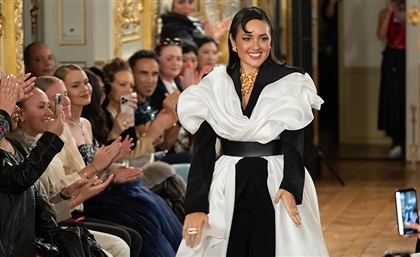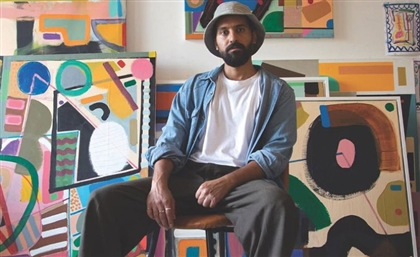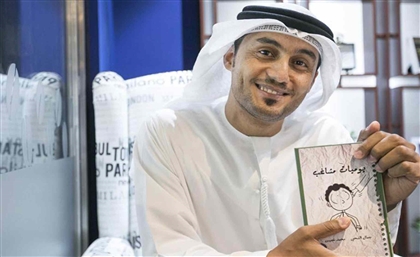The Regenerative Roots of Nazeerah: US-Based, Egyptian-Made
With regenerative farming practices, ethical labor laws and complete transparency with the public, Nazeerah is showing how a brand can truly be sustainable.

The Birth of Nazeerah
Emily Mikhaiel, co-founder and creative director of Nazeerah, began her fashion journey by immersing herself in the scarf production process taking place in Egyptian villages such as Negada in Qena and Luxor. From these humble beginnings—driven by her belief in supporting the livelihoods of Egyptian farmers and weavers—she has grown her vision into a brand of her own, crafted by the very hands that first inspired her. Nazeerah, a sustainable ready-to-wear brand, is based in Portland, Oregon, where Mikhaiel resides.
-2f4c83c5-5cb9-4981-9b10-dc3e82757dd4.jpg)
From Law to Fashion
Co-founded by Mikhaiel, Mahmoud El-Gazzar, and Eissa Mohamed, Nazeerah officially launched in May 2024, though its seeds were planted in 2017. “I actually registered Nazeerah in 2017,” shares Mikhaiel, describing the act as “forceful manifestation.”
-c3910ba4-7b39-4f4c-b3f5-a87f8949e877.jpg)
After majoring in environmental law, Mikhaiel shifted careers from real estate to fashion, teaching herself fashion illustration and tech-packs along the way. “I push design boundaries because I don’t know what the boundaries are,” she explains. “Not being traditionally taught means I’m not constrained by the industry.”
The Inspiration Behind Nazeerah
“My grandmother, Nazeerah, is the inspiration behind the brand,” Mikhaiel shares. “She was a seamstress in her village, raising seven children on her own. Her resilience shaped everything I do.”
-5df7e10f-a668-404e-adb3-bae4c07ce973.jpg)
Mikhaiel also draws inspiration from nature, architecture, and biomimicry, finding beauty in Egypt’s rural landscapes and ancient techniques, such as self-cooling mud-brick houses and palm leaf roofs. “Coming from a farmer family, I understand the meaning of ‘earth to earth,’” adds El-Gazzar.
The Global Context: Fashion’s Sustainability Crisis
The fashion industry produces a staggering 92 million tonnes of textile waste annually, contributes 20% of global water pollution, and is responsible for 10% of global carbon emissions, according to The Ellen MacArthur Foundation. Sustainability, once a niche conversation, has now become a buzzword for brands hoping to attract a more conscious consumer.
-efb9c56b-28e5-4cf7-a845-c74a49255efd.jpg)
But amidst the noise, how can one differentiate genuine commitment from mere marketing? True sustainability requires transparency: third-party certifications, clear supply chain information, and ethical labor practices. Enter Nazeerah—a brand whose commitment to sustainability transcends a catchy tagline, standing as its guiding principle.
Rooted in Responsibility
Nazeerah’s ethos is built on environmental and social responsibility, with regenerative farming practices at its core. Unlike conventional methods that deplete resources, regenerative farming restores soil health and promotes ecosystem balance. By using natural compost instead of synthetic fertilizers, implementing natural pest control, and minimizing water usage, the brand exemplifies a commitment to sustainability that benefits both people and the planet.
-99fc878d-2051-4f6e-aead-becdee9a656d.jpg)
From Manufacturing Giants to Purposeful Beginnings
El-Gazzar and Mohamed bring 22 years of experience in textile manufacturing, having worked with industry giants like Tommy Hilfiger and Calvin Klein, as well as homegrown Egyptian brands like Concrete. In 2021, they launched their own consultancy, which led to a meeting with Mikhaiel.
During a sourcing discussion, Mikhaiel’s unconventional requests stood out. “She asked for biodegradable, 100% natural materials—natural latex from tree sap, cotton fusing, and even 100% cotton fleece for shoulder pads,” recalls El-Gazzar. “We’d never received such a request in two decades of manufacturing.” Inspired by her vision, the duo knew they wanted to be part of something bigger.
-61b6bac6-0d22-41bd-a98b-16e7fb47dd47.jpg)
Sustainability in Action
“I’m obsessed with the end-of-life cycle of products,” Mikhaiel shares. “I think constantly about returning materials back to the soil.” Nazeerah embraces a circular model of sustainability, focusing on longevity, repairability, and biodegradability.
Their commitment extends beyond materials. The brand collaborates directly with farmers and artisans, regularly visiting fields and factories to ensure ethical practices. “Our workers are passionate about their craft, and it shows in the quality,” says El-Gazzar. “Regenerative crops have baraka—a blessing that chemical crops simply don’t.”
-5247b2be-b511-456a-83da-7ed8d1512dc6.jpg)
Transparency as a Principle
“If you say you’re a sustainable brand, U.S. consumers expect transparency,” Mikhaiel explains. “But in Egypt, the concept is still new, and we’ve faced pushback in manufacturing.”
-b0e30edf-ef67-4fa0-baf3-05e35881e3da.jpg)
Nazeerah tackles this challenge head-on. Its website provides detailed information on sourcing, production processes, and the people behind the brand. This transparency not only builds trust but also educates consumers about sustainability.
Standout Pieces and Aesthetic Philosophy
“Our standout pieces include a halter dress with side panels and a drop-waist dress inspired by the traditional galabeya,” Mikhaiel tells Scene Styled. She blends American prep-a-porter ease with Upper Egyptian influences, creating versatile designs made from natural fibers.
-7cc2413a-94a6-4da3-a4e1-01fb66d04270.jpg)
In the Words of Mikhaiel…
“Consumers are demanding accountability from brands,” she says. “They’re tired of greenwashing and constant advertising.” Studies back this up: over 70% of consumers want transparency, and 60% are willing to change shopping habits to reduce environmental impact.
As Mikhaiel notes, “The future of fashion isn’t just about looking good—it’s about doing good.”
- Previous Article Kult Klassic Koffee Kulture Will Open in District 5
- Next Article 'No Other Land' Becomes Palestine's Fifth Film Nominated for an Oscar
Trending This Week
-
Dec 27, 2025


























